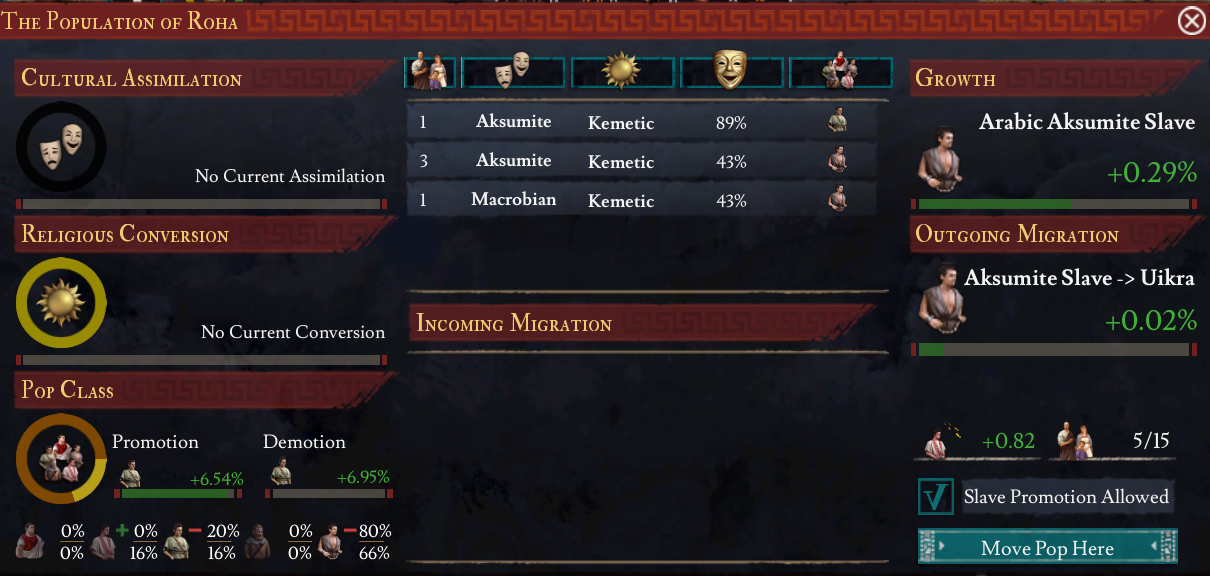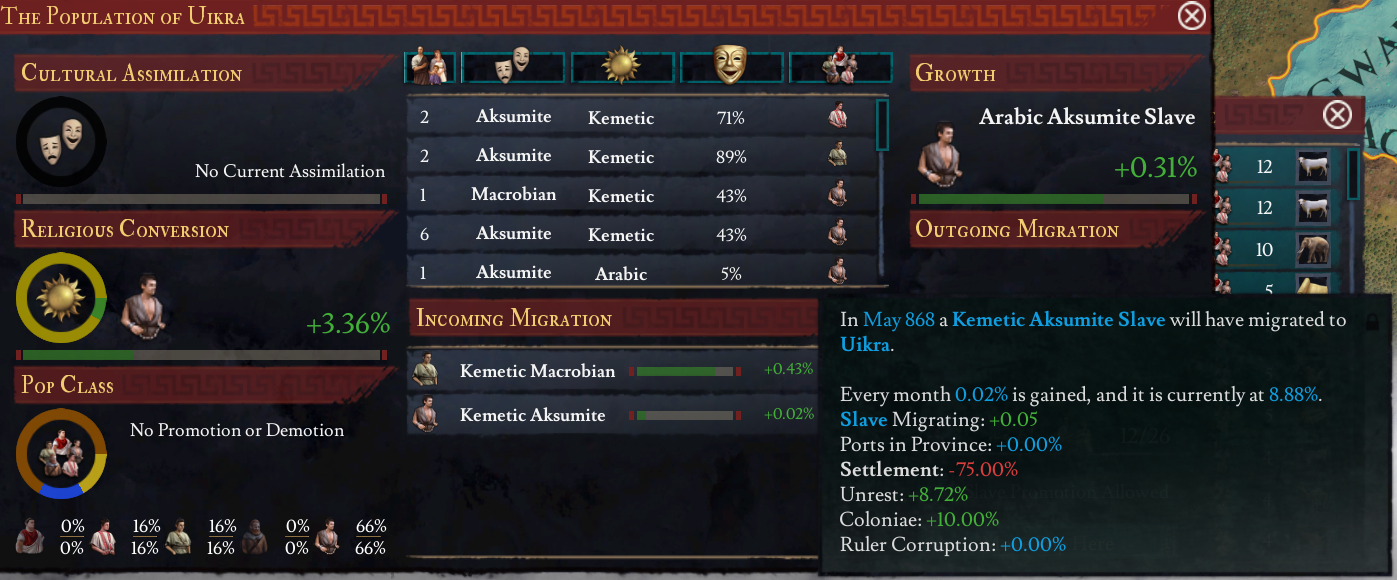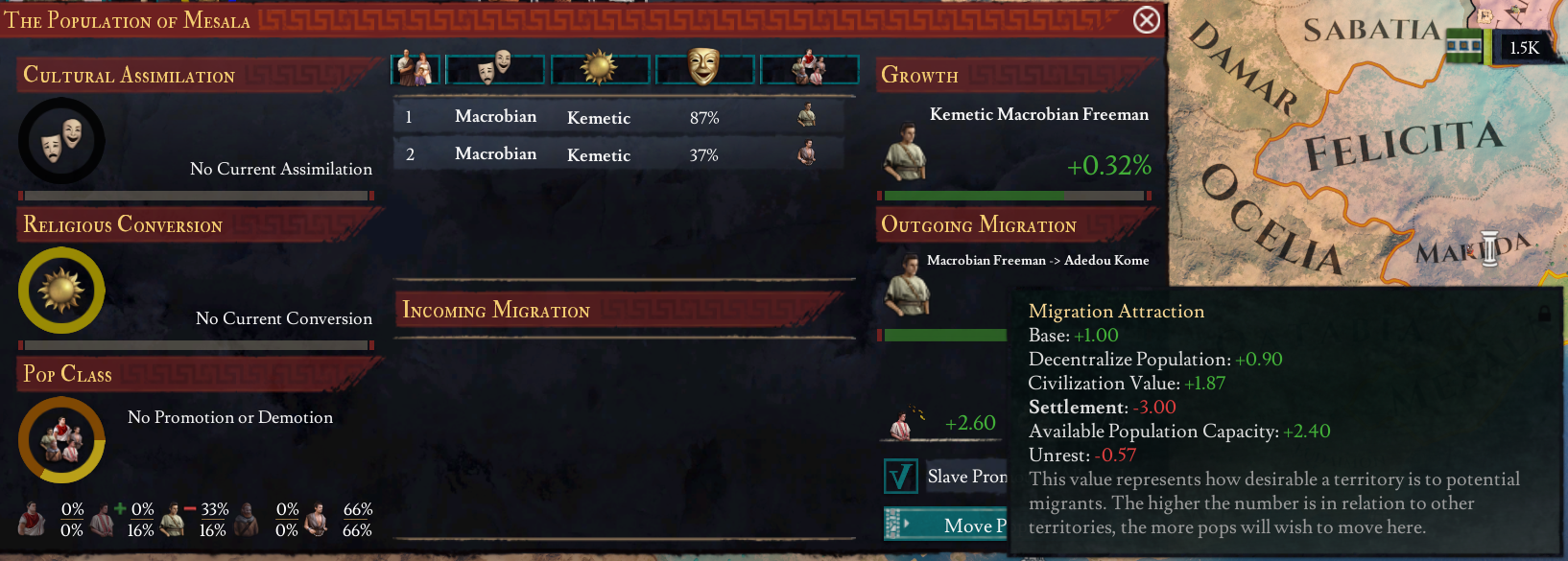Disclaimer: The following feedback turned out to sound more like a rant than I wanted to! I love 2.0 and just want the game to continue on its successful way!
_____________________________________
I usually enjoy both expansion and peaceful building in strategy games.
Imperator is an exception.
While the peaceful part got a lot better with each patch (Arheo be praised), I often don't know what to do during peacetime. It's not that I don't know the effects of buildings and pops, I study the wiki and the tooltips thoroughly.
It's rather a problem of extremely situational pop yields and building effects. Many effects only help you if several additional prerequisites are fulfilled.
Don't get me wrong, I'm all for complexity, that's why I'm here and not playing shooters or mobile games. But too often it is a huge effort to get everything right, just to have it all demolished by a single pop that moves away for various reasons. That the game doesn't warn you about losing a production surplus for example is another big problem.
Examples:
Slave production surplus:
By far the worst offender. There's no difference between having zero slaves in a city and 19! only the 20th has an effect. Sure, you can lower the number through buildings and tech, but it's always a sweet spot that you need to hit and the game doesn't help you. It's no problem to arrange things manually if you own only a handful of provinces, but expansionists will have dozens of provinces with hundreds of territories very soon. Keeping slaves where they have the most effect is a can of worms and also very expensive. Good luck judging whether the effort will pay off.
Oh, and there's another side effect: The more instances of "minus X slaves needed for local surplus" you stack, the quicker you profit. The exponential curve of return on investment is turned in the wrong direction IMO - shouldn't the first investment have the biggest impact with diminishing returns for further investments?
Trade routes from pops:
If you don't have the right combination of 0,15 from nobles and 0,05 from citizens, you get nothing. 4 nobles and 7 citizens give you 0,95 trade routes, which is rounded to zero. There's no in-game help to hit the right number more easily.
Science from pops and buildings:
There's is a hard cap on research efficiency, meaning additional nobles or citizens might not contribute to your science output at all. There's no info on how far you are above the cap either - it could be 1%, it could be 100%, there's no difference and the game won't tell you. A warning when you fall below the threshold or are too far above it would do wonders. Having to check for this manually all the time isn't great game design.
Science from libraries, trade routes from roads and markets:
It's a small percent modifier that won't help you much if you don't have a megacity (which we wanted to avoid for various reasons!). Also, the problems listed above apply as well.
Conversion from libraries, assimilation from markets:
The small % modifier awakens the illusion that these buildings help with these effects, but their effect is negligible without a strong base rate the right governor policy, or from great theatres/temples. While we're at it: there is also no warning that your assimilation governor policy did its job and all pops are your culture - it just continues without effect....
Buildings that often have a minimal effect and are rarely worth building:
Marketplace - see above
Library - see above
Ports - none of the effects will usually help you much
Tax office - hardly ever worth the building slot in the current commerce-based meta
Training camp - manpower is usually sufficient in the lategame. In the early game, there's more important buildings
Granary - Food stores rarely tend to run dry in my games
Earthworks - rarely worth the pop cap penalty in a city
____________________________________
I believe that these problems come from the lack of a trade/economy overhaul. Many buildings and pop effects lost their importance due to the constant balance changes.
A few additional warnings/popups/automatisms would also do wonders to more easily achieve what you want to do.
A new trade system with countable trade goods (a bit like in vic2) could fix some of the problems, especially regarding production and slaves (When each slave contributes to a production that is finished after a certain time).
I hope this will turn out to be a constructive discussion about how to improve the economy and trade part of this otherwise great game!
_____________________________________
I usually enjoy both expansion and peaceful building in strategy games.
Imperator is an exception.
While the peaceful part got a lot better with each patch (Arheo be praised), I often don't know what to do during peacetime. It's not that I don't know the effects of buildings and pops, I study the wiki and the tooltips thoroughly.
It's rather a problem of extremely situational pop yields and building effects. Many effects only help you if several additional prerequisites are fulfilled.
Don't get me wrong, I'm all for complexity, that's why I'm here and not playing shooters or mobile games. But too often it is a huge effort to get everything right, just to have it all demolished by a single pop that moves away for various reasons. That the game doesn't warn you about losing a production surplus for example is another big problem.
Examples:
Slave production surplus:
By far the worst offender. There's no difference between having zero slaves in a city and 19! only the 20th has an effect. Sure, you can lower the number through buildings and tech, but it's always a sweet spot that you need to hit and the game doesn't help you. It's no problem to arrange things manually if you own only a handful of provinces, but expansionists will have dozens of provinces with hundreds of territories very soon. Keeping slaves where they have the most effect is a can of worms and also very expensive. Good luck judging whether the effort will pay off.
Oh, and there's another side effect: The more instances of "minus X slaves needed for local surplus" you stack, the quicker you profit. The exponential curve of return on investment is turned in the wrong direction IMO - shouldn't the first investment have the biggest impact with diminishing returns for further investments?
Trade routes from pops:
If you don't have the right combination of 0,15 from nobles and 0,05 from citizens, you get nothing. 4 nobles and 7 citizens give you 0,95 trade routes, which is rounded to zero. There's no in-game help to hit the right number more easily.
Science from pops and buildings:
There's is a hard cap on research efficiency, meaning additional nobles or citizens might not contribute to your science output at all. There's no info on how far you are above the cap either - it could be 1%, it could be 100%, there's no difference and the game won't tell you. A warning when you fall below the threshold or are too far above it would do wonders. Having to check for this manually all the time isn't great game design.
Science from libraries, trade routes from roads and markets:
It's a small percent modifier that won't help you much if you don't have a megacity (which we wanted to avoid for various reasons!). Also, the problems listed above apply as well.
Conversion from libraries, assimilation from markets:
The small % modifier awakens the illusion that these buildings help with these effects, but their effect is negligible without a strong base rate the right governor policy, or from great theatres/temples. While we're at it: there is also no warning that your assimilation governor policy did its job and all pops are your culture - it just continues without effect....
Buildings that often have a minimal effect and are rarely worth building:
Marketplace - see above
Library - see above
Ports - none of the effects will usually help you much
Tax office - hardly ever worth the building slot in the current commerce-based meta
Training camp - manpower is usually sufficient in the lategame. In the early game, there's more important buildings
Granary - Food stores rarely tend to run dry in my games
Earthworks - rarely worth the pop cap penalty in a city
____________________________________
I believe that these problems come from the lack of a trade/economy overhaul. Many buildings and pop effects lost their importance due to the constant balance changes.
A few additional warnings/popups/automatisms would also do wonders to more easily achieve what you want to do.
A new trade system with countable trade goods (a bit like in vic2) could fix some of the problems, especially regarding production and slaves (When each slave contributes to a production that is finished after a certain time).
I hope this will turn out to be a constructive discussion about how to improve the economy and trade part of this otherwise great game!
Last edited:
- 5
- 4
- 2




